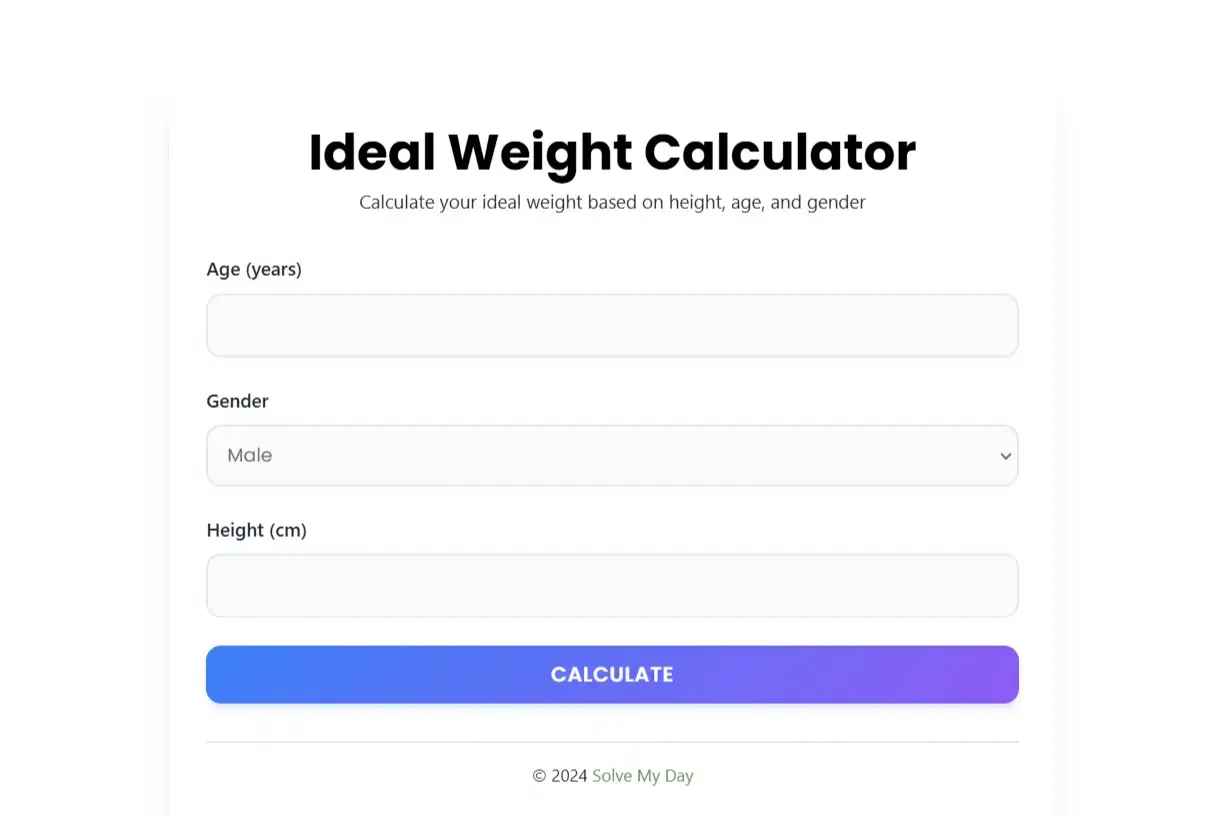Try our BMR Calculator to quickly and accurately measure your basal metabolic rate, with personalized result interpretations tailored to your health goals.
BMR Calculator
How to Measure
- Weight: Measure in morning before eating
- Height: Stand straight against wall, mark height
- Use recent measurements for accuracy
BMR Calculator: Unlock Your Health Goals with This Free Tool
Ever wonder how many calories your body burns in a day? Or how much you need to eat to lose weight, build muscle, or simply maintain where you are? The answer lies in understanding your Basal Metabolic Rate (BMR).
Your BMR is like the engine of your body—it keeps you running, even when you’re doing nothing at all. And the easiest way to figure it out? Using a BMR Calculator.
In this guide, we’ll explain:
- What BMR means and why it matters for your health goals.
- How to calculate BMR with simple formulas.
- What influences your BMR beyond the basics like age, weight, and activity.
- Common mistakes to avoid when using a BMR calculator.
- Tips for using your BMR to lose weight, gain muscle, or maintain energy.
Let’s dive in.
What is BMR and Why Is It Important?
BMR Meaning: Your Body’s Base Energy Needs
BMR stands for Basal Metabolic Rate, which is the number of calories your body burns just to stay alive. It’s the energy your body needs to fuel essential functions like:
- Breathing.
- Circulating blood.
- Regulating body temperature.
- Digesting food.
Think of it as the calories you’d burn if you stayed in bed all day.
Why Does Knowing Your BMR Matter?
If you’re serious about your health goals, knowing your BMR is the first step. It helps you create a calorie plan based on your unique needs. For example:
- To lose weight, you need to eat fewer calories than you burn (calorie deficit).
- To gain muscle, you need to eat more calories than you burn (calorie surplus).
- To maintain weight, you eat the same number of calories you burn.
Without knowing your BMR, you’re guessing. And guessing leads to frustration, stalled progress, and wasted time.
How to Calculate BMR: 3 Proven Methods
BMR is calculated using scientific formulas that take into account your age, gender, weight, height, and sometimes body fat percentage. Here are the three most common methods:
1. Mifflin-St Jeor Equation (Most Accurate)
This modern formula is highly accurate and widely used:
- For men:
BMR = 10 × weight (kg) + 6.25 × height (cm) – 5 × age (years) + 5 - For women:
BMR = 10 × weight (kg) + 6.25 × height (cm) – 5 × age (years) – 161
2. Harris-Benedict Equation (Older Formula)
While less accurate for today’s lifestyles, it’s still a reliable method:
- For men:
BMR = 13.397 × weight (kg) + 4.799 × height (cm) – 5.677 × age (years) + 88.362 - For women:
BMR = 9.247 × weight (kg) + 3.098 × height (cm) – 4.330 × age (years) + 447.593
3. Katch-McArdle Equation (For Athletes)
This formula uses lean body mass (LBM), making it ideal if you know your body fat percentage:
BMR = 370 + (21.6 × LBM in kg)
Pro Tip: Don’t want to crunch numbers? Use our free BMR Calculator to do the work for you.
There are three widely-used formulas to calculate BMR. Each has its strengths, and the right choice depends on your body type and available information.
| Formula | Best For | Notes |
| Mifflin-St Jeor | Most people (most accurate) | Gold standard; widely used for weight loss, muscle gain, and maintenance. |
| Harris-Benedict | Older formula, less common | Slightly outdated but still effective for estimating BMR. |
| Katch-McArdle | Athletes or people with high muscle mass | Requires knowing your body fat percentage to calculate lean body mass. Ideal for bodybuilders. |
Which Formula Should You Use?
- If you’re new to BMR or don’t know your body fat percentage, go with Mifflin-St Jeor for accuracy.
- If you’re an athlete or have access to body fat percentage data, try the Katch-McArdle formula for more precise results.
- The Harris-Benedict formula works well, but it’s less accurate for modern lifestyles.
Tip: Want to skip the math? Use our free BMR Calculator, and let it do the hard work for you.
What Influences BMR Besides the Basics?
While BMR is heavily influenced by your age, gender, weight, and height, there are additional factors that can tweak your results:
1. Genetics
Some people are born with a naturally faster or slower metabolism. If weight management feels especially challenging for you, your genes may play a role.
2. Muscle Mass
Muscle burns more calories than fat. The more muscle you have, the higher your BMR. That’s why strength training can be a game-changer for boosting metabolism.
3. Hormones
Hormonal imbalances (e.g., thyroid issues) can affect how efficiently your body burns calories. A slow thyroid can lower BMR, while a hyperactive thyroid can increase it.
4. Stress
Chronic stress can mess with your metabolism. Stress hormones like cortisol can lead to weight gain or make it harder to lose weight.
5. Sleep
Poor sleep can slow down your metabolism, decrease energy levels, and even increase hunger hormones. Aim for 7–9 hours of quality sleep each night.
Common BMR Calculator Mistakes to Avoid
While BMR calculators are an excellent tool, it’s easy to make mistakes. Here’s how to avoid them:
1. Using Outdated Measurements
Always use your current weight, height, and activity level. Using old numbers can lead to inaccurate results.
2. Choosing the Wrong Activity Level
Be honest about your activity level. For example, if you exercise three times a week but spend the rest of your day sitting, select “Lightly Active” instead of “Moderately Active.”
3. Ignoring Body Composition
If you have high muscle mass, your calorie needs may be higher than the average calculation. Consider this when creating your plan.
4. Relying Solely on the Calculator
Remember, a BMR calculator gives an estimate. Use it as a guide, but adjust based on how your body responds to changes in diet and exercise.
How to Use Your BMR for Weight Loss or Muscle Gain
1. For Weight Loss:
- Create a calorie deficit of 500–750 calories/day.
- Avoid eating below your BMR—it can harm your metabolism.
2. For Muscle Gain:
- Add a calorie surplus of 250–500 calories/day.
- Focus on protein-rich foods to support muscle growth.
3. For Maintenance:
- Match your calorie intake to your activity-adjusted BMR.
FAQs about BMR Calculator
1. What Factors Affect BMR?
1. Age: Slows down as you age.
2. Gender: Men usually have higher BMR due to more muscle mass.
3. Weight & Height: Larger bodies burn more calories.
4. Muscle Mass: More muscle = higher BMR.
2. Can I Increase My BMR?
1. Build muscle through strength training.
2. Stay active throughout the day.
3. Avoid crash diets that slow metabolism.
4. Get enough sleep and reduce stress.
3. Should I Recalculate My BMR Regularly?
4. Is It Safe to Eat Below My BMR?
5. How does Indian climate affect BMR?
1. Higher in cold regions (North India)
2 Lower in tropical areas (South India)
3. Seasonal variations affect metabolism
4. Regional diets evolved to match climate needs
6. What’s the difference between BMR and TDEE for Indians?
For Indians, TDEE varies based on:
1. Traditional lifestyle patterns
2. Regular activities (yoga, walking)
3. Regional physical activity levels
4. Dietary habits
Calculate Your BMR Today
Your journey to better health starts here. Use our free BMR Calculator to:
- Know your body’s energy needs.
- Set realistic weight loss or muscle gain goals.
- Stay on track without guessing.
It’s simple, fast, and can transform the way you approach nutrition and fitness.
Calculate your BMR now and take the first step toward a healthier you!




